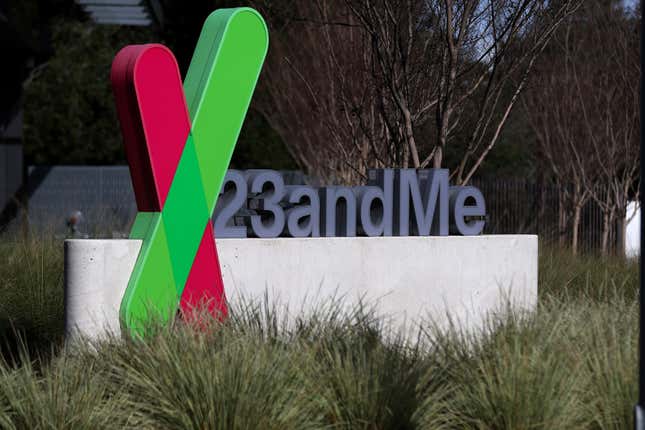
In This Story
23andMe (ME0.00%), the company that popularized consumer genetic testing, is facing significant financial and leadership challenges as it approaches the possibility of being delisted from the Nasdaq.
The company’s stock has plummeted by 98% since going public in 2021, and it now faces a Nov. 4 deadline to replace its board and keep its share price above $1 in order to remain listed.
Its dramatic decline comes amid broader concerns over the company’s financial stability, recent privacy breaches, and a leadership shake-up.
Here’s a closer look at how 23andMe reached this breaking point.
The promising rise of 23andMe
Founded in 2006 by Anne Wojcicki, Paul Cusenza, and Linda Avey, 23andMe set out to make genetic testing more widely accessible via a direct-to-consumer model. The company quickly grew its customer base by offering affordable DNA test kits, with support from high-profile investors including Google (GOOGL-1.57%) co-founder Sergey Brin. Wojcicki and Brin married in 2007 and divorced in 2015.
23andMe’s at-home kits allowed customers to exchange a saliva sample for insights into their genome relating to things such as their possible ancestry, health, and food preferences. The company amassed 1 million customers in 2015; 23anMe now says it has 15 million customers worldwide.
In 2021, the company went public through a special purpose acquisition company (SPAC) merger and was valued at around $3.5 billion.
The company also expanded into other business, including drug discovery and more recently weight loss.
Financial and data privacy challenges
However, 23andMe’s financial situation started to sour shortly after it went public, as sales of its flagship test kits already began to decline — along with those of its competitors. By the 2023 fiscal year, 23andMe reported a net loss of $312 million. The company’s individual share price is down 98% since 2021 to about $4, after a reverse stock split on October 16, 2024.
Privacy concerns compounded its financial struggles. In October 2023, hackers breached 23andMe’s systems, accessing the personal information of nearly 7 million customers. This resulted in a $30 million settlement.
Leadership crisis
In addition to financial and operational difficulties, 23andMe has experienced significant turmoil within its leadership.
On Sept. 17, seven members of the board sent Wojcicki a letter, who also serves as the board’s chair, announcing their immediate resignations.
“While we continue to wholeheartedly support the company’s mission and believe deeply in the value of the personalized health and wellness offering that you have articulated, it is also clear that we differ on the strategic direction for the company going forward,” the members wrote in the letter.
The board had grown dissatisfied with the direction Wojcicki was taking the company. Despite already controlling 49.75% of the voting rights, Wojcicki wanted to increase her influence further by taking the company private.
Wojcicki first announced her intentions to go private in April, and filed in August a non-binding transaction proposal with the U.S. Securities and Exchange Commission (SEC).
According to the filing, Wojcicki offered to buy all outstanding shares of the company at $0.40 a share, an 11% premium of 23andMe’s closing stock price in April.
“Our experience with the short-term focus of the public markets has led me to believe that the company will be best equipped to execute against this mission as a private entity, allowing us to remove certain public company costs and distractions,” Wojcicki wrote in the proposal.
She added that she hoped to complete the transaction “as promptly as possible” and would not support any alternative deals.
In August, before their resignations, a special committee of the board asked Wojcicki to withdraw her “stated intent to oppose any alternative transaction.” It said if it did not receive an improved offer from Wojcicki, the committee would pursue alternative deals including offers from third parties.
In their September resignation letter, the board stated that they had not received any “actionable proposal” from Wojcicki.
“That we have not seen any notable progress over the last 5 months leads us to believe no such proposal is forthcoming,” they wrote.
Future uncertainty
Despite the setbacks, Wojcicki remains cautiously optimistic about 23andMe’s future.
“I think we can navigate and land this plane,” Wojcicki told Fortune in her first on-the-record interview since the mass resignations, “but it is absolutely complicated.”
At the time, Wojcicki told the outlet she could not comment further on the board crisis or whether she’s seeking new directors.